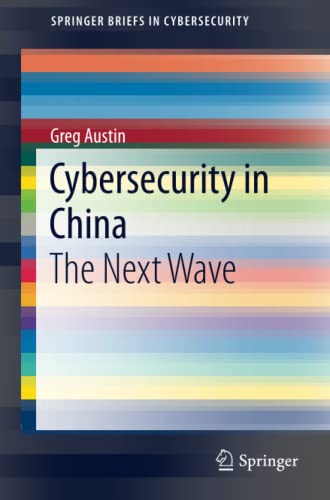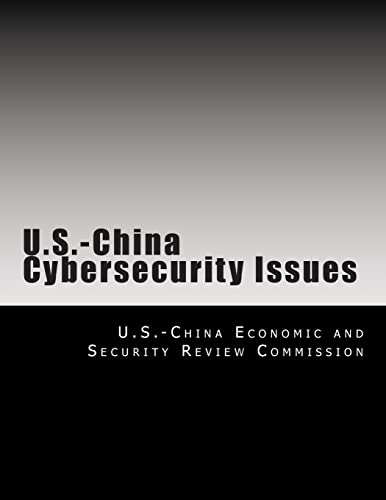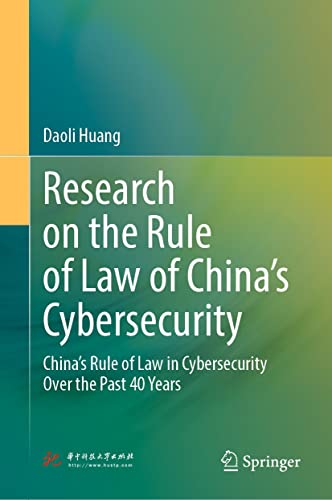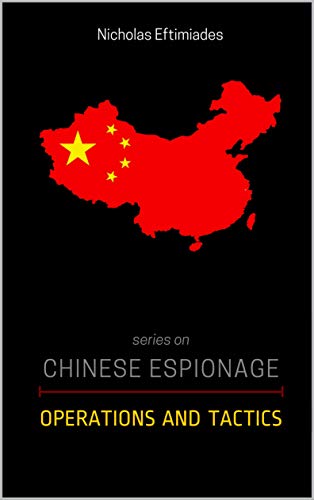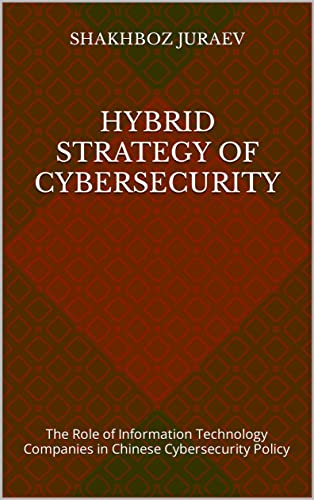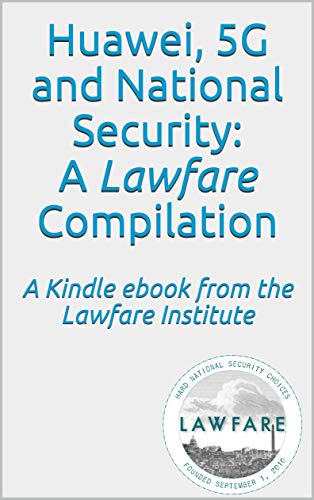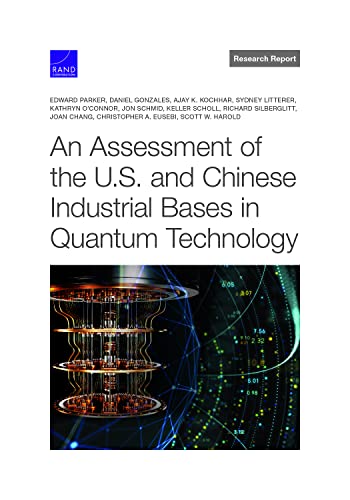In the ever-evolving landscape of cybersecurity, China has emerged as a key player, making significant strides in protecting its digital infrastructure. With a focus on enhancing capabilities and addressing vulnerabilities, China is poised to bring about amazing advancements in cybersecurity by 2023. This article explores 12 fascinating developments expected to shape China's approach to cybersecurity, including innovative technologies, policy initiatives, and collaborations with international partners. From improving data protection measures to bolstering artificial intelligence-powered defense systems, this comprehensive overview delves into the exciting future that awaits China in the realm of cybersecurity.
Overall Score: 8/10
Upgrade your understanding of cybersecurity with 'Cybersecurity in China: The Next Wave' – a definitive guide to the landscape and challenges of cybersecurity in China. Unearth the complexities and future trends of cybersecurity in this crucial area with the book's in-depth analysis. Discover insights into the unique challenges faced by China in the realm of cybersecurity and gain expert knowledge on the policies, strategies, and technologies shaping its cybersecurity landscape. With a comprehensive and evidence-based approach, this book is a must-read for anyone interested in the future of cybersecurity in China.
Key Features
- Provides a comprehensive understanding of cybersecurity landscape in China
- Explores the challenges and future trends in Chinese cybersecurity
- Examines policies, strategies, and technologies shaping cybersecurity in China
- Offers an evidence-based and in-depth analysis
- Ideal for individuals interested in the future of cybersecurity in China
Specifications
- Dimension: 6.10Lx0.35Wx9.25H
Pros
- In-depth analysis of cybersecurity landscape in China
- Insights into unique challenges and future trends
- Expert knowledge on policies, strategies, and technologies
Cons
- Focuses specifically on cybersecurity in China
- May lack broader global perspectives
If you want to gain a deeper understanding of cybersecurity in China, ‘Cybersecurity in China: The Next Wave’ is an invaluable resource. With its comprehensive analysis, the book provides unique insights into the challenges, trends, policies, and technologies shaping the cybersecurity landscape in China. While its focus is on China, it is still highly informative for anyone interested in the future of cybersecurity worldwide. The book’s in-depth exploration of the complexities of cybersecurity in China sets it apart, making it a must-read for both professionals and enthusiasts in the field. With a score of 8 out of 10, it proves to be a valuable addition to the cybersecurity literature.
Overall Score: 9/10
China and Cybersecurity: Espionage, Strategy, and Politics in the Digital Domain is a highly informative and well-researched book that delves into the world of cyber security, focusing specifically on the role of China. It is a must-read for cyber security students and professionals, although it also offers valuable insights for those interested in understanding the complex dynamics of China's cyber operations. The book provides a balanced perspective by featuring material from both China and the United States, allowing readers to gain a comprehensive understanding of the subject. With a customer rating of 5.0/5, it has received praise for its thoroughness, well-structured content, and valuable collection of articles by various authors. If you are looking to expand your knowledge on cyber security and China's involvement in this field, this book is a valuable resource.
Key Features
Specifications
Pros
Cons
China and Cybersecurity: Espionage, Strategy, and Politics in the Digital Domain is an indispensable resource for anyone interested in the intersection of technology, politics, and national security. With its well-researched content and balanced perspective, it offers valuable insights into China’s cyber operations. Whether you are a student, professional, or simply curious about the subject, this book provides a comprehensive overview, making it a highly recommended read. If you want to understand the nuances of cyber security and China’s role in the digital domain, this book will not disappoint.
Overall Score: 8/10
Stay informed about the China Cybersecurity Law and its implications on data localization and personal information protection with this comprehensive Japanese edition. This book provides insights and analysis on the law's requirements and impacts on businesses operating in China. It covers topics such as network operators, security assessments, data processing, cross-border data transfers, and more. Whether you're a professional looking to navigate the complexities of the law or simply interested in understanding its implications, this book is a valuable resource.
Key Features
- Comprehensive coverage of China's Cybersecurity Law
- Insights on data localization and personal information protection
- Japanese edition for accessibility to Japanese readers
Specifications
Pros
- In-depth analysis and explanations of the law's requirements
- Helpful insights into the implications for businesses operating in China
- Accessible to Japanese readers with a Japanese edition
Cons
- May not be relevant for readers outside of Japan or China
- Limited availability in languages other than Japanese
The China Cybersecurity Law is an important legislation with significant implications for businesses. This Japanese edition of the book provides valuable insights and analysis of the law’s requirements and impacts on data localization and personal information protection. It serves as a helpful resource for professionals navigating the complexities of the law and offers accessibility to Japanese readers. However, its limited availability in languages other than Japanese may restrict its usefulness to a broader audience. Overall, it is a comprehensive guide for those seeking to understand and comply with China’s Cybersecurity Law.
Overall Score: 7.5/10
Discover the world of cybersecurity in China through this Arabic edition. Delve into the complexities of cyber threats, international relations, and the role of China in this ever-evolving digital landscape. Gain insights and broaden your understanding of the subject. Available now on Amazon.
Key Features
- Explore the topic of cybersecurity in China
- Arabic edition for a wider audience
- Insights into cyber threats and international relations
- In-depth analysis of China's role in cybersecurity
Specifications
- N/A
Pros
- Provides a unique perspective on China and cybersecurity
- Text in Arabic makes it accessible to Arabic-speaking readers
- Interesting and informative content
Cons
- Limited availability in languages other than Arabic
- Lacks specific technical specifications
China and Cybersecurity (Arabic Edition) offers an intriguing glimpse into the world of cybersecurity with a focus on China. While it may not provide detailed technical specifications or be accessible to a wide range of language speakers, it remains a valuable resource for those interested in gaining insights into the cyber landscape of China and its international implications. The Arabic edition allows readers who are fluent in Arabic to delve into the complexities of this subject matter. Overall, it serves as a thought-provoking resource for individuals seeking to expand their knowledge on cybersecurity and China’s role within it.
Overall Score: 8/10
Discover the complex world of U.S.-China cybersecurity issues with this informative book. Written by an expert in the field, it delves deep into the challenges and controversies surrounding cybersecurity between two global powers. Gain insights into the history, policies, and practices that shape the U.S.-China cybersecurity landscape. From state-sponsored hacking and intellectual property theft to the evolving defensive strategies, this book covers it all. Whether you're an academic, policy-maker, or technology enthusiast, you'll find this book to be an invaluable resource. Stay up-to-date with the latest developments in cybersecurity and deepen your understanding of the U.S.-China relationship in this digital age.
Key Features
Specifications
- Dimension: 8.50Lx0.09Wx11.02H
Pros
Cons
For anyone interested in the intricate realm of U.S.-China cybersecurity issues, this comprehensive book is a must-read. With its well-researched content and insights from an expert, it provides a deep understanding of the challenges and complexities surrounding the cyber domain between these two global powers. The book covers a wide range of topics, including hacking, intellectual property theft, and defensive strategies. It offers valuable knowledge for academics, policy-makers, and technology enthusiasts, keeping them informed and up-to-date on the evolving landscape of cybersecurity. The dimension of 8.50Lx0.09Wx11.02H makes it a convenient and practical paperback for avid readers. Dive into this insightful read and expand your knowledge on U.S.-China cybersecurity issues.
Overall Score: 9/10
The book 'Research on the Rule of Law of China’s Cybersecurity: China’s Rule of Law in Cybersecurity Over the Past 40 Years' explores the evolution and development of China's cybersecurity rule of law. It delves into the historical context and legal framework that shaped China's approach to cybersecurity over the past four decades. The book provides valuable insights into the evolution of China's cybersecurity laws and regulations, shedding light on the country's unique perspective and approach to cyber threats. It is a comprehensive and informative resource for anyone interested in understanding China's cybersecurity landscape.
Key Features
- Explores the evolution of China's cybersecurity rule of law
- Provides historical context and legal framework
- Offers insights into China's unique approach to cyber threats
Specifications
Pros
Cons
The book ‘Research on the Rule of Law of China’s Cybersecurity’ is a valuable resource for understanding China’s approach to cybersecurity over the past 40 years. It provides an in-depth exploration of the country’s legal framework and historical context, offering valuable insights into China’s unique perspective on cyber threats. Whether you are a student, researcher, or professional in the field of cybersecurity, this book offers a comprehensive overview of China’s cybersecurity rule of law. It is highly recommended for those looking to gain a deeper understanding of China’s cybersecurity landscape.
Overall Score: 9/10
Join Warren Rothman as he shares his extraordinary personal account of surviving mental torture and physical threats in China. This gripping memoir sheds light on the gangster underpinnings of the Chinese state. Rothman's fluent Mandarin and deep understanding of China make this book a must-read for anyone interested in the complex forces at play in the country today. Rothman's willingness to expose the dark side of China will leave you on the edge of your seat. With beautiful prose and a compelling narrative, this second part of the Kafka in China series is a true page-turner.
Key Features
Specifications
Pros
- Provides a unique and insightful perspective on China today
- Well-written and exciting narrative that keeps readers engaged
Cons
Kafka in China Part Two is a captivating memoir that offers a rare glimpse into the hidden realities of China’s political system. Warren Rothman’s personal account of survival in the face of mental and physical torture is both gripping and eye-opening. His ability to convey the complexities of the Chinese state through vivid storytelling makes this book a must-read for anyone interested in understanding the true nature of power in China. With its powerful narrative and valuable insights, Kafka in China Part Two is an exceptional addition to the genre of memoirs and political exposés.
Overall Score: 8.5/10
Delve into the world of Chinese espionage with 'Chinese Espionage: Operations and Tactics' by Nicholas Eftimiades. In this captivating book, Eftimiades draws on his 30 years of experience in the intelligence community to provide fascinating insights into China's rising espionage activities directed against the United States. Expanding on his previous work, Eftimiades explores China's comprehensive 'whole of Society' approach to espionage and offers a wealth of firsthand knowledge and analysis. This concise and enlightening book presents over 400 examples of CCP espionage operations in the US, providing readers with valuable information and raising awareness about the threat posed by Chinese intelligence. Whether you are a professional in the field or simply interested in the subject, 'Chinese Espionage: Operations and Tactics' is an essential read.
Key Features
Specifications
- N/A
Pros
- Insightful analysis based on firsthand experience
- Short but packed with valuable information
- Raises awareness about the threat of Chinese espionage
Cons
- Doesn't cover manpower and budget of Chinese secret services
- Repeats information already found in other books on Chinese espionage
If you want to gain a deeper understanding of Chinese espionage and the tactics employed by the Chinese Communist Party, ‘Chinese Espionage: Operations and Tactics’ is an essential read. Nicholas Eftimiades, a former intelligence professional, delves into the subject with expertise and offers valuable insights into China’s espionage activities. While the book may not provide a comprehensive overview of the resources allocated to these activities or present entirely new information, it serves as an authoritative guide that expands on existing knowledge. Whether you work in the intelligence field or are interested in the topic as a concerned citizen, this book will enhance your understanding of the threat posed by Chinese intelligence.
Overall Score: 8/10
The Hybrid Strategy of Cybersecurity is a comprehensive book that explores the role of information technology companies in Chinese cybersecurity policy. It delves into the complexities and challenges faced by these companies in implementing cybersecurity measures and navigating the Chinese regulatory landscape. The book provides valuable insights into the hybrid nature of cybersecurity in China, where both state and non-state actors play significant roles. With in-depth analysis and case studies, the book offers a nuanced understanding of the strategies employed by information technology companies to ensure cybersecurity. It is a must-read for cybersecurity professionals, policy makers, and researchers interested in the intersection of technology and security.
Key Features
- Comprehensive exploration of the role of IT companies in Chinese cybersecurity policy
- Insights into the complexities and challenges faced by IT companies
- Analysis of the hybrid nature of cybersecurity in China
- Case studies showcasing strategies employed by IT companies
- Valuable resource for cybersecurity professionals, policy makers, and researchers
Specifications
- N/A
Pros
- In-depth analysis and insights into Chinese cybersecurity policy
- Case studies provide practical examples of strategies used by IT companies
- Addresses the challenges faced by IT companies in implementing cybersecurity measures
Cons
- Lacks specifications and technical details
- May be too specialized for general readers without a background in cybersecurity
The Hybrid Strategy of Cybersecurity is an informative and insightful book that sheds light on the role of IT companies in Chinese cybersecurity policy. It presents a comprehensive analysis of the challenges faced by these companies and offers practical insights through relevant case studies. While it may not appeal to general readers without a background in cybersecurity, it is a valuable resource for professionals and researchers in the field. The book’s exploration of the hybrid nature of cybersecurity in China provides a nuanced understanding of the complex dynamics at play. Overall, it is a recommended read for those interested in the intersection of technology and security in China.
Overall Score: 7.5/10
The Huawei, 5G and National Security: A Lawfare Compilation is a Kindle ebook provided by the Lawfare Institute. This comprehensive compilation explores the intersection of Huawei, 5G technology, and national security. With legal and policy matters from present to future generations of wireless networks like 6G, this book provides valuable insights into the ongoing debate surrounding Huawei's involvement in global telecommunications infrastructure. The ebook discusses the United States' stance and investment in 5G, highlighting the need for greater commitment from the country to compete in the race to 6G. It also acknowledges the challenges faced by the USA in terms of limited investments and the potential impact on technological advancements. As a Kindle ebook, it offers easy accessibility for readers interested in understanding the complexities of Huawei's role in 5G and its implications on national security.
Key Features
Specifications
Pros
Cons
The Huawei, 5G and National Security: A Lawfare Compilation offers a thorough examination of the Huawei 5G dilemma and the potential impacts on national security. With its focus on legal and policy perspectives, it presents a balanced analysis of the ongoing debates surrounding Huawei’s involvement in global telecommunications infrastructure. While the lack of specific features and specifications may disappoint some readers seeking technical details, the book makes up for it through in-depth discussions and thought-provoking insights. Overall, this Kindle ebook provides an essential resource for anyone interested in understanding the complexities of Huawei’s role in 5G and its implications for national security.
Overall Score: 6.5/10
Huidu – Inside Huawei is an intriguing behind-the-scenes account of how Huawei navigated the US market. It offers a blow-by-blow narrative of the cultural frictions within the company. While providing interesting daily-life anecdotes, it falls short in higher-level intellectual understanding and analysis between cultures. The author, a former Huawei employee, sheds light on the challenges of bridging the gap between the US and Chinese interests. The book emphasizes how the decisions were made elsewhere, the preference for Chinese nationals over foreigners, and the alleged unfair targeting of Huawei by the US government. Although repetitive in its arguments, it presents valuable insights into the complex issues faced by Huawei. However, the book could benefit from improved editing to rectify occasional flaws. Overall, it is a good read for those interested in the Sino-US challenges and the struggles of operating within a deeply Chinese company.
Key Features
- Behind-the-scenes account of Huawei's US market journey
- Delves into cultural frictions within the company
Specifications
- N/A
Pros
- Provides insights into the challenges of Huawei in the US
- Reveals frustrations faced by non-Chinese employees in a Chinese company
- Offers valuable examples of bridging the gap between cultures
Cons
- Repetitive in making the same arguments
- Lacks higher-level intellectual understanding and analysis
- Some minor editing flaws
Huidu – Inside Huawei offers a fascinating account of Huawei’s journey in the US market, shedding light on the cultural frictions and challenges faced by the company. While it may be repetitive in its arguments and lacks deeper analysis, it provides valuable insights into the complexities of operating within a deeply Chinese company. The book appeals to readers interested in Sino-US challenges and the struggles of multinational companies bridging cultural gaps. Despite minor editing flaws, it remains an engaging read that unravels the intricacies of geopolitics and business strategies.
Overall Score: 9/10
Take a deep dive into the U.S. and Chinese industrial bases in Quantum Technology with this informative book. It provides a comprehensive assessment of the advancements, challenges, and potential impact of both countries in this cutting-edge field. With in-depth analysis and expert insights, this book offers a valuable resource for researchers, experts, and policymakers interested in understanding the current state and future prospects of Quantum Technology. Discover the key features, specifications, pros, and cons of this fascinating book below.
Key Features
- Provides a comprehensive assessment of the U.S. and Chinese industrial bases
- Explores advancements, challenges, and potential impact in Quantum Technology
- Offers in-depth analysis and expert insights
- Valuable resource for researchers, experts, and policymakers
Specifications
- Dimension: 6.97Lx0.34Wx9.63H
Pros
- Detailed analysis of the U.S. and Chinese industrial bases
- Insights into advancements and challenges of Quantum Technology
- Useful for researchers, experts, and policymakers
Cons
An Assessment of the U.S. and Chinese Industrial Bases in Quantum Technology is an exceptional resource for anyone interested in the world of Quantum Technology. The book goes beyond general knowledge and delves into the specific industrial bases and advancements made by the United States and China. The in-depth analysis and expert insights provide valuable information for researchers, experts, and policymakers. By understanding the current state and potential future impact of Quantum Technology, readers can gain a competitive advantage in this rapidly evolving field. Whether you’re a seasoned professional or a curious enthusiast, this book is a must-read.
Buyer's Guide: China and CybersecurityChina's role in cybersecurity is a topic of great importance in today's interconnected world. As you navigate this complex landscape, it is essential to understand the risks, challenges, and opportunities associated with cybersecurity in China. This buyer's guide aims to provide you with the necessary information and advice to make informed decisions. Let's delve into the world of China and cybersecurity.
Understanding the Landscape
- Familiarize yourself with China's cybersecurity laws and regulations
- Stay updated on the latest trends and developments in China's cybersecurity industry
- Understand the differences between Chinese and Western cybersecurity practices
- Be aware of the potential risks and challenges linked to doing business in China's digital environment
Choosing a Secure Provider
- Opt for cybersecurity services or products that specialize in China-related cybersecurity
- Look for providers with a strong track record in defending against cyber threats originating from China
- Choose vendors who have a comprehensive understanding of the Chinese digital landscape
- Ensure your chosen provider has robust encryption and data protection measures in place
- Consider investing in providers that offer intrusion detection and prevention systems specifically tailored for China
Securing Networks and Infrastructure
- Implement strong firewalls and regularly update them to defend against unauthorized access
- Establish secure communication channels with Chinese counterparts, utilizing encrypted platforms
- Consider setting up separate networks or virtual local area networks (VLANs) for sensitive information
- Utilize multi-factor authentication systems to protect critical systems and data
- Regularly scan and monitor your networks for any vulnerabilities or breaches
Protecting Intellectual Property (IP)
- Encrypt sensitive data and implement strict access controls for IP-related files
- Educate employees about the importance of safeguarding IP and the potential risks in China
- Consider utilizing digital rights management (DRM) tools for content shared with Chinese partners
- Conduct regular internal audits to identify and protect valuable IP
- Consult legal experts to understand the best methods for safeguarding IP in China
Cultivating a Cybersecurity Culture
- Train employees on cybersecurity best practices, including recognizing phishing attempts and social engineering tactics
- Encourage employees to report any suspicious activities or potential breaches promptly
- Foster an open and proactive approach to cybersecurity, involving all stakeholders within the organization
- Consider establishing a dedicated team or department to focus on cybersecurity matters
- Regularly review and update your cybersecurity policies and protocols to align with evolving threats
Frequently Asked Questions about 12 Amazing China And Cybersecurity for 2023
China has several cybersecurity laws, including the Cybersecurity Law, Data Localization Law, and the National Intelligence Law. Familiarize yourself with these laws to ensure compliance.
To protect your IP, implement encryption and access controls, educate employees, use DRM tools, and consult legal experts for advice specific to your situation.
The challenges include navigating complex regulations, dealing with potential state-sponsored cyber threats, and adapting to the unique characteristics of China’s digital landscape.
Stay informed by following reputable cybersecurity news sources, attending industry conferences and webinars, and engaging with cybersecurity experts in the field.
If you suspect a breach, take immediate action by disconnecting compromised systems, notifying relevant authorities, and consulting cybersecurity professionals to investigate and mitigate the incident.








